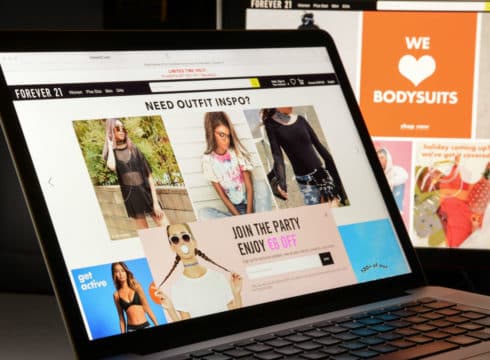ABFRL had started to downsize Forever 21's stores and costs after reporting a loss
It has now refurbished its website’s looks taking inspiration from the US Forever 21 website
Big fashion retail players are now entering the space with hybrid offline-online biz model
Inc42 Daily Brief
Stay Ahead With Daily News & Analysis on India’s Tech & Startup Economy
Aditya Birla Fashion and Retail Ltd (ABFRL), the Indian licensee of US fast fashion brand, Forever 21, has re-launched its ecommerce website, as the company plans to grab a slice of country’s lucrative online fashion retail market with a revamped hybrid offline-to-online ecommerce model.
The company, which was started in Los Angeles and sells clothes, accessories, footwear, and other fast fashion apparel, entered Indian market in 2010. In July 2016, ABFRL acquired both offline and online rights of Forever21 India from its previous partners, DLF Brands and Diana Retail, for $26 Mn (INR 185 Cr). The company had reported a 2015-16 revenue turnover of INR 262 Cr ($36.8 Mn).
However, ABFRL soon started to downsize Forever 21’s stores and costs after reporting a loss in net sales. At the beginning of 2018, ABFRL started to restructure the business model for Forever 21. At the time, the brand had 22 stores across major cities.
“Our internal assumptions for growth were very high in this business, but the profitability requires deeper correction and we realised that we had built up a lot of inventory,” Livemint had cited ABFRL’s managing director Ashish Dikshit as saying.
ABFRL has now refurbished the looks of Forever 21’s website taking inspiration from the US Forever 21 website.
“The website has been revamped with consumer-friendly features for more accessibility and product discoverability. The site also provides a recommendation on the basis of your search history,” the company said in a statement.
The brand competes with international fast fashion apparel makers such as Spain’s Zara, Sweden’s H&M, among others.
Retailers Shift To Hybrid Offline-Online Ecommerce Model
India’s thriving ecommerce sector is largely driven by the country’s rising purchasing power, which is currently the second-largest in the Asia-Pacific region in terms of GDP based on purchasing power parity (PPP). The sector is estimated to achieve a $150 Bn market value by 2022.
Over the years, not only the multinational companies but even the homegrown fashion retail players have started taking a keen interest in the offline-to-online ecommerce model. For instance, Reliance Industries Limited (RIL) has decided to foray into the ecommerce sector adopting the offline-online ecommerce model atop its 7,500 stores across India, as ofJuly 2018.
Similarly, fashion retailer V-Mart Retail last year announced its plan on adopting an online-offline strategy with new stores and a warehouses. Kishore Biyani’s Future Group is also working on a similar hybrid model, Tathastu, under its Retail 3.0 plan.
The entry of dedicated fashion houses entering the ecommerce space directly could pose a stiff challenge to popular ecommerce giants, Flipkart and Amazon, which are largely dependent upon its sellers’ product base.
Moreover, with the Indian government floating a policy that restricts online marketplaces from influencing the sale price of products, or deep discounting practice, has put these ecommerce companies in a tight spot. In this space, Forever 21 has made a come back into the country’s ecommerce sector at an interesting juncture.
{{#name}}{{name}}{{/name}}{{^name}}-{{/name}}
{{#description}}{{description}}...{{/description}}{{^description}}-{{/description}}
Note: We at Inc42 take our ethics very seriously. More information about it can be found here.


